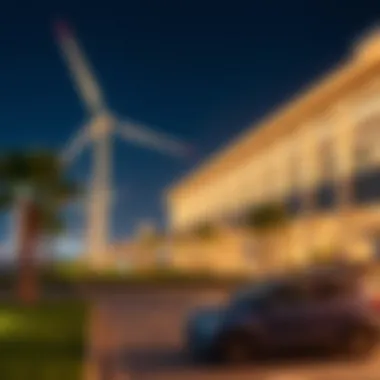The Impact of DEWA on Dubai's Real Estate Market


Intro
As Dubai continues on its ambitious trajectory towards becoming a world-class metropolis, the role of the Dubai Electricity and Water Authority (DEWA) is often overlooked. However, DEWA is more than just a utility provider; it is a critical player in shaping the real estate landscape of this vibrant city. By ensuring access to reliable energy and water resources, DEWA lays the groundwork for property developments that cater to the needs of residents and investors alike.
This article seeks to illuminate how DEWA’s operational strategies and sustainability initiatives impact the broader context of Dubai’s real estate market. It explores the intricate relationship between utility services, urban infrastructure, and property investments. Readers will gain insights into current market trends, future projections, and the implications for potential homeowners and property investors. With heightened awareness of the sustainability measures that DEWA is rolling out, stakeholders can navigate the shifting sands of the real estate sector with greater confidence.
In an age where environmental concerns are increasingly shaping investment decisions, understanding DEWA’s role is pivotal. The article aims to furnish readers with a robust understanding of energy and water management, as well as the projected market dynamics that are set to emerge in Dubai’s booming real estate scene.
Prelims to DEWA
In the heart of Dubai, the Dubai Electricity and Water Authority (DEWA) stands as a pivotal player in shaping the emirate's landscape, not only in terms of utility provision but also in influencing the real estate market. This section lays the groundwork for understanding DEWA’s essential roles and functions within the broader urban framework. With ever-growing demands on resources, particularly in a bustling metropolis like Dubai, DEWA's actions resonate deeply with property developers, investors, and residents alike. In this exploration, we will take a closer look at DEWA's historical roots and its current operations, revealing how this entity is more than a utility provider; it is a cornerstone of the city’s infrastructure and growth strategy.
Historical Overview
The roots of DEWA can be traced back to 1992, during a period when Dubai began expanding at an unprecedented pace. Initially, the organization was established to ensure that the electricity and water supply could meet the needs of a burgeoning population and a rapidly growing economy. This historical backdrop is vital; it highlights the evolution of services from basic needs to the sophisticated, innovative solutions that DEWA delivers today.
From its inception, the authority aimed to integrate new technologies and efficient practices, which was quite the foresight considering the skyrocketing demands expected in the years to follow. The establishment of DEWA was not merely the introduction of a utility but rather a framework that set the pace for urban development in Dubai. As high rises started to punctuate the skyline, DEWA was there, lighting up offices and homes, ensuring that this vibrant hub would not only grow but thrive.
Current Functions and Services
Fast forward to the present, and DEWA has branched out into various functions that extend beyond typical utility services, becoming a leader in sustainability and efficiency. It provides a wide array of services, including electricity and water supply, desalination of seawater, and smart grid technologies that enable more efficient energy usage. One of the standout features of DEWA’s current operations is its commitment to sustainability.
- Smart Metering: Implementing advanced metering infrastructure helps monitor consumption and enhance efficiency.
- Green Initiatives: DEWA actively promotes solar energy projects to align with Dubai's sustainability goals.
- Innovative Technologies: The ongoing adoption of artificial intelligence and smart devices in resource management reflects DEWA’s adaptability.
"DEWA is not just managing utilities; it’s pioneering a roadmap for sustainability in urban living," says an industry expert.
These functions not only fulfill the basic needs of Dubai's populace but also provide investors with confidence regarding the reliability of infrastructure, which in turn drives property values. For potential homeowners and investors, understanding DEWA's operational framework is critical as it affects everything from construction to long-term livability in their chosen neighborhoods. As such, acknowledging DEWA's historical journey and current offerings can provide invaluable insight into the city’s real estate dynamics.
Importance of DEWA in Dubai's Urban Development
The Dubai Electricity and Water Authority (DEWA) plays a significant role in shaping the urban landscape of Dubai. As the backbone of the city's essential services, its influence can be seen in multiple facets of urban growth. DEWA's operations not only support the infrastructural needs of both residential and commercial sectors but also propel the real estate market forward, making it a key player in Dubai's urban development strategy.
One of the primary aspects is infrastructure and real estate. DEWA provides the vital electricity and water services that form the very foundation of urban living. Without consistent and reliable energy and water supply, any plans for residential developments or commercial complexes would hit a roadblock. An investor considering properties in Dubai must recognize that their confidence is tied closely to DEWA’s operational efficiency and reliability. A well-functioning DEWA ensures that the urban infrastructure can grow at a pace that matches the soaring demand of a burgeoning population and evolving business landscape.
In addition to supporting basic needs, DEWA actively engages in sustainability initiatives. With the global push towards greener practices, DEWA's commitment to renewable energy projects and conservation strategies addresses both environmental concerns and consumer demands for sustainable living spaces. This not only enhances the allure of Dubai real estate but also provides an edge in property valuation. Consequently, buyers and investors are increasingly considering these factors when making decisions, especially in neighborhoods that embrace green technologies.
Moreover, the relevant regulatory framework established by DEWA is crucial for guiding the development trajectory of the real estate sector. Regulations set forth by DEWA ensure compliance with safety standards and promote energy efficiency. This legal backing gives investors peace of mind, knowing that any development project aligns with governmental standards and sustainability goals.
"Understanding DEWA’s role is key for anyone navigating Dubai’s real estate market. It’s about the interplay between service reliability, sustainability, and regulatory support, all of which hold significant weight in property investments."
In summary, DEWA's importance lies not just in what it delivers, but how it propels and supports a multifaceted urban development strategy. Its influence permeates through the core of Dubai’s infrastructure and property investments, impacting investor confidence and shaping the real estate landscape holistically. Stakeholders in the market must keep a keen eye on DEWA’s initiatives and policies, as they will inevitably shape the future of real estate in one of the fastest-growing cities in the world.
Impact of DEWA on Property Investment


The Dubai Electricity and Water Authority (DEWA) plays a pivotal role in shaping property investment in Dubai. By ensuring a stable supply of essential utilities, DEWA fosters an environment where investors can make informed decisions. The ripple effects of its operations can be observed in various facets of the real estate sector, from enhancing property values to attracting new developments.
Influence on Market Trends
DEWA’s initiatives significantly steer the trends within the real estate market. The authority is not just a utility provider, but a catalyst for growth. When new neighborhoods are developed, DEWA lays the groundwork—literally—by providing the necessary infrastructure. Projects like Solar Park have far-reaching impacts, encouraging developers to adapt green strategies and to market sustainable living options.
The emphasis on sustainability has led to a shift in consumer preferences, with many buyers actively seeking eco-friendly homes. Investors recognize this shift and gear their portfolios towards properties characterized by energy efficiency and smart technology. Concrete examples can be seen in communities such as Mohammed Bin Rashid Al Maktoum Solar Park, where property prices have soared due to their sustainable energy solutions being prioritized.
DEWA's influence has also created a ripple effect on market demand. As new developments emerge, their reliance on modern utilities leads to an increase in property value. Investors often look for signs of infrastructure readiness, and DEWA’s infrastructure developments serve as a beacon illuminating potential growth areas.
"The infrastructural integrity ensured by DEWA confirms that investment in Dubai’s real estate is not just about location but also about sustainability and resilience of utilities."
Assessing Investor Confidence
Investor confidence is tightly intertwined with the services offered by DEWA. For any property investor, the assurance of consistent electricity and water supply is non-negotiable. DEWA’s commitment to reliability builds a strong foundation for investment. This not only promotes real estate developments, but it also encourages longer-term investments. When investors perceive that essential services are not only present but also innovatively managed, they exhibit heightened confidence in the market.
Moreover, DEWA's transparency in operations further bolsters investor trust. Regular updates and clear communication on infrastructure projects and upcoming plans foster a sense of security. Stakeholders in the property sector find comfort in knowing that they are not navigating a faceless entity; DEWA engages with the community and keeps investors in the loop.
In times of global economic uncertainties, such as fluctuations in oil prices or international trade tensions, the continuous provision of reliable services acts like a stabilizing anchor. Investors are more likely to secure properties in areas influenced by DEWA’s ongoing developments than in those lacking such assurances.
In summary, the role of DEWA in shaping property investment cannot be overstated. It presents both a benchmark for quality and a model for sustainability. The synergy formed through its infrastructure and service delivery instills confidence among investors, painting a bright picture for the future of Dubai's real estate landscape.
Sustainability Initiatives by DEWA
Sustainability has become a cornerstone in evaluating the success and future of urban infrastructure, and DEWA plays an essential role in this dynamic. Its various initiatives and projects in sustainable practices are not only significant in managing resources effectively but also influence property values and investment opportunities within Dubai’s residential and commercial sectors. Real estate stakeholders must look closely at how these sustainability measures interact with the market as they can serve as a competitive edge for properties that align with green standards.
Projects Promoting Renewable Energy
DEWA is pushing the envelope when it comes to integrating renewable energy sources into its operations. One of the standout projects is the Mohammed bin Rashid Al Maktoum Solar Park, which aims to become a global leader in solar energy production. This impressive facility is expected to generate 5,000 MW by 2030.
By harnessing solar power, DEWA not only reduces dependence on fossil fuels but contributes to lowering greenhouse gas emissions. The relevance here for investors is tangible: properties in areas close to these renewable energy initiatives often see a boost in value. It’s part of a broader trend where energy-efficient homes and structures come with a higher appeal.
- Advantages of Renewable Energy Projects:
- Cost Savings: Long-term financial savings for both DEWA and consumers through lower energy costs.
- Enhanced Property Value: Properties equipped with energy-efficient features become increasingly sought after.
- Positive Environmental Impact: Aligning with sustainability goals, appealing to eco-conscious buyers.
Water Conservation Strategies
Water conservation is another pillar of DEWA's sustainability approach. Given Dubai’s arid climate and high demand for water resources, DEWA's strategies are paramount for the future of both the environment and the real estate market. The authority offers an array of initiatives, from awareness campaigns to advanced irrigation systems, aimed at ensuring efficient water usage.
A notable project is the "Smart Water Meter" initiative, designed to give consumers a real-time look at their water usage. This not only helps in personal accountability but also identifies potential leaks, leading to effective water management. For property developers, incorporating such smart technologies can increase property attractiveness, aligning with consumer preferences for tech-savvy, energy-efficient homes.
"Water conservation is no longer just a choice; it's a necessity for sustaining our environment and economy."


- Key Strategies in Water Conservation:
- Public Awareness Campaigns: Educating the community on the importance of water conservation.
- Innovative Infrastructure: Building and upgrading water delivery systems that minimize wastage.
- Incentives for Green Systems: Providing benefits to property developers who implement water-saving measures in their designs.
The implications of these initiatives extend beyond immediate resource management. They indicate a shift in how Dubai approaches urban living, prioritizing sustainability. Real estate professionals need to consider these factors when making their investments to ensure they are aligning with Dubai's vision for a sustainable future.
Emerging Neighborhoods and DEWA's Role
The relationship between emerging neighborhoods in Dubai and the Dubai Electricity and Water Authority (DEWA) is a crucial aspect of the city's rapid urban development. As more residents and investors flock to Dubai, understanding DEWA's role cannot be underestimated. This section will explore how DEWA influences the infrastructure of these neighborhoods and the implications this has for real estate investors and buyers alike.
Infrastructure Development in Up-and-Coming Areas
Emerging neighborhoods such as Dubai South and the newer parts of Jumeirah Village Circle are hotspots for real estate activity. However, this growth comes with its own set of challenges, particularly concerning the demand for power and water services. DEWA's proactive approach to addressing these needs is vital in ensuring that these neighborhoods can thrive.
- Reliable Utility Services: As developers rush to build new projects, the demand for utilities can increase exponentially. DEWA ensures that these new areas are equipped with a robust supply of electricity and water, avoiding potential bottlenecks that could slow down development. This not only keeps the lights on but also instills confidence among investors.
- Smart Grids and Technology: DEWA has been integrating smart grid technology into its infrastructure. This enables efficient energy distribution, reduces wastage, and allows residents to monitor their consumption. Such advancements make emerging neighborhoods more attractive to environmentally conscious buyers.
In summary, as DEWA continues to expand its services into these neighborhoods, it creates a framework that supports successful property investments while simultaneously pushing the envelope in terms of innovation and sustainability.
Case Studies of Successful Neighborhoods
To illustrate DEWA's pivotal role in fostering emerging neighborhoods, we can look at specific examples that have successfully integrated DEWA’s initiatives into their development strategies.
- Dubai South: Initially planned as a logistical hub, Dubai South has evolved into a thriving community, much thanks to DEWA’s foresight in implementing sustainable services early on. The incorporation of solar energy initiatives not only supports residential needs but also aligns with Dubai's wider goals for reducing carbon emissions.
- Al Furjan: This residential area showcases how DEWA’s reliable service can attract higher property values. The neighborhood benefits from comprehensive utility management, making it appealing to families and investors alike. The infrastructure supports schools, parks, and retail outlets without overwhelming utility demands.
"DEWA does not just provide power and water; it forms the backbone of Dubai's growth strategies, especially in its emerging neighborhoods."
- Mohammad Bin Rashid City: This ambitious project highlights an integration of luxury living with sustainability. DEWA's advanced planning has allowed it to cater to the high demands of this neighborhood while promoting water conservation strategies that ensure longevity in resource use.
Challenges Facing DEWA and the Real Estate Market
In order to grasp the intricate dynamics of Dubai's real estate landscape, one must first acknowledge the multifaceted challenges that the Dubai Electricity and Water Authority (DEWA) encounters. These challenges do not merely affect DEWA itself; they resonate throughout the entire real estate market, influencing everything from investment decisions to urban expansion. In this context, addressing DEWA's challenges helps investors, property managers, and homeowners understand the broader implications on property values, development timelines, and sustainability initiatives.
Managing Demand and Supply
A significant challenge that DEWA faces is managing the constant fluctuations between demand and supply of electricity and water in an ever-growing city like Dubai. As the emirate attracts a diverse influx of residents due to its booming economy and luxurious lifestyle, the consumption rates of utilities are expected to soar. This surge in demand necessitates not just immediate production, but also careful strategic planning to ensure long-term sustainability.
Consequently, DEWA invests heavily in not just maintaining current infrastructure but also in upgrading it to meet future demands. For instance, in 2021, the authority embarked on initiatives aimed at expanding its capacity through renewable energy sources. These investments not only bolster supply but also respond to global environmental standards, reassuring investors that projects align with sustainable practices.
"The significance of managing demand and supply extends beyond operational efficiency; it serves as a cornerstone for fostering investor confidence."
Regulatory Hurdles and Solutions
DEWA's operations are not just influenced by market demands, but also by a plethora of regulatory requirements imposed by local and international authorities. Navigating these legal landscapes can be daunting. The interplay between regulatory frameworks and DEWA's objectives often leads to delays in project approvals, impacting the overall timeline for real estate developments.


However, DEWA has developed solutions to circumvent many of these regulatory roadblocks. By working collaboratively with the Dubai Land Department and other pertinent agencies, DEWA has streamlined processes. For instance, the implementation of the "Green Building Regulations" aims to encourage sustainable designs while ensuring compliance with regulatory mandates.
Additionally, DEWA frequently engages in dialogues with investors and developers, offering insights into upcoming regulatory changes that may affect the market. This proactive communication encourages a sense of partnership, empowering stakeholders to plan strategically.
Investors should remain vigilant and adaptable, keeping abreast of regulatory changes and proactively engaging with DEWA to mitigate any potential setbacks in their projects. As the market continues to evolve, those who adapt to regulatory challenges stand a better chance of thriving.
Through a comprehensive understanding of these challenges, one can appreciate the complexity and dynamism of DEWA's role in the real estate market. By tackling the demand-supply equation and overcoming regulatory hurdles, DEWA not only secures its operational viability but also reinforces the foundation upon which Dubai's real estate future stands.
Future Projections for DEWA and the Real Estate Sector
The future of the Dubai Electricity and Water Authority (DEWA) is not just a question of energy supply; it's intertwined with the every-faceted real estate market of Dubai. As investors and property managers look to the horizon, understanding DEWA's evolving landscape offers crucial insights into what the future may bring. An informed perspective on this interplay can significantly enhance strategic planning and decision-making in the real estate sector.
Trends in Infrastructure Investment
As the throbbing heart of Dubai's urban life, the infrastructure investments by DEWA will shape not only the way energy and water are consumed but also the attractiveness of property development. DEWA has embarked on ambitious projects aimed at modernizing its infrastructure. Here are a few trends worth noting:
- Smart Technologies: DEWA is already integrating smart grids and meters, which allow for more efficient energy usage. These developments reduce waste and create a sustainable model that is likely to attract eco-conscious investors.
- Resilient Urban Design: With climate change posing numerous threats, DEWA's investments in resilience—such as solar parks and energy-efficient water treatment facilities—are becoming essential. Properties near these advancements may see increased value.
- Public-Private Partnerships: In a bid to expedite infrastructure enhancements, DEWA is fostering collaborations with private developers. This approach not only spreads financial risk but also promotes quicker project completion, directly impacting property desirability.
In summary, infrastructure investment trends present rich opportunities for stakeholders in the real estate market, provided they align their strategies with DEWA's innovative thrust.
Impact of Global Economic Factors
The global economy knows no boundaries, and its fluctuations have ripple effects even on the local scale of Dubai's real estate market. Understanding how DEWA navigates these complexities will help investors mitigate risks and seize opportunities. Here are some of the dynamics at play:
- Commodity Prices: As oil and material costs fluctuate, DEWA finds itself adapting in various ways. The rising cost of raw materials can delay construction projects, potentially creating a bottleneck that affects property prices.
- Foreign Investment Trends: The strength of global currencies directly influences foreign investment. For instance, if the dollar weakens, the allure of Dubai properties for international buyers may diminish, thereby affecting demand. DEWA's role in maintaining affordable utilities becomes crucial here.
- Sustainability and Global Standards: Internationally, there's a shift towards greener investments, pressing industries—including utilities—to adopt sustainable practices. DEWA's commitment to sustainability will likely create favorable conditions for investment, attracting those looking to consider long-term environmental impacts.
In the larger panorama, the collaboration between DEWA and economic trends will likely shape property valuations and investment flows. As such, staying attuned to these signals will be paramount for investors contemplating future moves in Dubai's real estate domain.
Overall, understanding DEWA's future strategies will help property developers, buyers, and investors navigate and leverage the intricate relationship between energy, sustainability, and real estate in a rapidly evolving marketplace.
End: The Symbiotic Relationship between DEWA and Real Estate
Understanding the connection between the Dubai Electricity and Water Authority (DEWA) and the dynamics of real estate in Dubai is like seeing two dancers move in harmony. Each move that DEWA makes positively influences the rhythm of the property market, shaping investments and lifestyles alike.
Assessment of Current and Future Strategies
Currently, DEWA is not just a utility provider; it is a powerhouse influencing the real estate landscape significantly. Their focus on sustainability, for instance, reflects a clear strategy to adapt to global demands for eco-friendly development. Investors and developers are keenly aware that properties powered by renewable resources often fetch a better market price. This shift is driven by consumers who are increasingly valuing energy efficiency and lower utility costs.
Looking forward, DEWA’s vision for 2030 asserts a commitment to innovation that is set to enhance the efficiency of infrastructure. The focus on smart grid technologies and renewable energy will further shift how properties are developed and marketed. The cost-effective operation of these infrastructures will directly influence overall property values. Thus, as investors, staying ahead of these trends is crucial for making informed decisions.
Final Thoughts on Investor Considerations
When it comes to the property market, knowledge is power. Investors eyeing opportunities in Dubai should consider DEWA’s role not only as a service provider but as a catalyst for growth in emerging neighborhoods.
- Consider the benefits of infrastructure backed by a responsible and innovative provider.
- Assess the implications of sustainability initiatives on future property valuations.
- Look closely at how regulatory changes driven by DEWA impact investment prospects; these may include incentives for green buildings or changes in utility rates.
The intersection of DEWA and the property market forms a rich tapestry from which informed investment strategies can be drawn. Thus, investing time in understanding DEWA's evolving role will undoubtedly pay off as the Dubai skyline continues to transform with ambitious new projects.
"In the world of real estate, understanding the foundations—both literal and figurative—can make all the difference in turning a profit."



